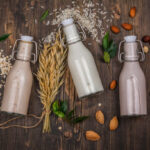Lacto vegetarians have special dietary needs. You can find out here what they are and whether there are any health risks for this type of vegetarian.
Three groups of vegetarians – who eats what?
Being Vegetarian is not the same as being vegetarian. Depending on the extent to which animal products are eliminated from the diet, a distinction is made between three large groups:
- Ovo-Lacto vegetarians: They eat eggs, milk, and milk products.
- Lacto-Vegetarian: They only accept milk and milk products.
- Vegans: They reject all animal foods, even honey.
Lacto vegetarianism
A Lacto-vegetarian diet is a special form of vegetarianism. The lacto-vegetarian not only avoids meat but also foods that are made using eggs. All other products derived from live animals, such as milk, milk products, and honey, are consumed by the Lacto-vegetarian. Plant-based foods such as fruit and vegetables can also be found on the menu of a Lacto-vegetarian.
- What Lacto vegetarians eat
- Plant foods
- dairy products and cheese
- honey
- What Lacto Vegetarians Don’t Eat
- meat
- Fish
- sea animals
- eggs
Why do Lacto vegetarians avoid eggs?
On the one hand, some Lacto-vegetarians do not eat eggs for moral reasons. On the other hand, some Lacto-vegetarians refuse to eat eggs to protect their health. Doctors, for example, advise type 2 diabetics with poorly adjusted blood values to hold back on egg consumption, as otherwise, the cholesterol can crystallize. In many cases, this process causes life-threatening inflammation in the arterial walls. Possible consequences: heart attack, stroke, or sudden cardiac death.
People with an LDL cholesterol value over 200 should also eat eggs in moderation to prevent atherosclerosis. Rheumatism patients are also advised not to eat eggs. Doctors even assume that a lacto-vegetable diet contributes to an improvement in general well-being and alleviates rheumatism symptoms (e.g. morning stiffness, joint pain, dry mouth, and eyes).
Are Lacto-vegetarians healthier?
Those who eat no meat have lower blood pressure and blood lipid levels and usually have a healthier body weight than non-vegetarians. In addition, the cancer death rate decreases. Avoiding certain foods can also prevent diseases such as gout and diabetes.
What are the consequences of a lacto-vegetarian diet?
Lacto-vegetarians who eat a balanced and varied diet take in all the essential nutrients. Deficiency symptoms are therefore very rare in the lacto-vegetable diet.
What does a balanced and varied diet look like? This is how Lacto-vegetarians get all the important nutrients:
- iron. Lacto-vegetarians should make sure to combine iron-rich foods such as grain products with fresh foods rich in vitamin C (e.g. kale or Brussels sprouts), as the body then has more iron available. Here you can read how much iron we need.
- Vitamin B12. Lacto-vegetarians absorb vitamin B12 primarily through milk and yogurt. Cottage cheese, Emmental, and Camembert are also vegetarian sources of vitamin B12. The German Society for Nutrition (DGE) recommends a daily intake of 3 µg.
- Vitamin D. Milk and dairy products provide the body with vitamin D. Vitamin D are also contained in chanterelles and mushrooms. However, sunlight is the most important source of vitamin D. Since the intensity of the sun is low in winter, however, taking a vitamin D supplement is recommended. You can find out how high your daily vitamin D requirement is here.
- calcium. The best sources of calcium are milk and dairy products. The calcium supply can also be ensured with vegetables such as kale, rocket, broccoli, or fennel. The German Nutrition Society (DGE) recommends that adults consume 1,000 milligrams of calcium per day.
- protein. Lacto-vegetarians can easily cover their daily protein requirements with vegetarian foods (e.g. lentils, pumpkin seeds, peanuts, oatmeal, quinoa): For a healthy diet, you should consume an average of one gram of protein per kilogram of body weight per day.



